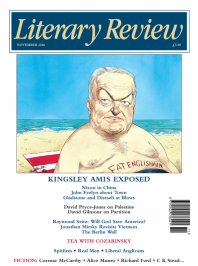Sebastian Shakespeare
Bleak Horizon
The Road
By Cormac McCarthy
Picador 256pp £16.99
Cormac McCarthy’s last novel, No Country for Old Men, was a humdinger of a thriller and had much in common with a Quentin Tarantino film. The author combined a pared-down prose style with a portrait of a violent and degenerate modern America. If you haven’t read it, I urge you to do so. It was a pure adrenaline rush from start to finish and the best thriller I have read for many a moon.
At first glance this novel seems to occupy different terrain. It is a dystopian tale set in the future. In truth, it is just another manifestation of the same morally disturbing vision. How would we cope, psychologically, with the end of the world? Many of us daydream about what it would be like to be among the last survivors on earth and then swiftly banish the notion from our heads as a remote outcome. The Road fleshes out this improbable conceit and evokes the full horror of such a predicament.
The chronology is uncertain from the start. An unnamed man and his son wander across a desolate America after some apocalyptic calamity. Not until page 22 do we get any sense of how much time has passed: ‘in those first few years the roads were peopled with refugees shrouded up in their clothing. Wearing masks and goggles. Sitting in their rags by the side of the road like ruined aviators.’ Even the precise nature of the disaster is left unsaid, though the aftermath is consistent with a nuclear holocaust. America is covered in ash and dust; burnt forests and fire-blackened boulders scar the landscape; birds and animals are extinct, and there are mummified corpses everywhere. The cadavers have one thing in common: they have all been discalced (left barefoot by thieves). Shoes, it seems, are the greatest commodity in the world to come. It is one of many chilling details.
At the outset of the story we find father and son doggedly pushing a cart towards the coast. They have nothing but a pistol to defend themselves against cannibals who stalk the countryside, and they are down to their last two bullets. Each night they light a fire in the woods and then cover their tracks. The pair are tormented by constant hunger. They don’t seek out human company. When the father shoots a man dead it is the first human being he has spoken to in a year.
The sense of desperation, fear and loneliness is superbly evoked. The book is unremittingly bleak, but it’s mesmerising, and redeemed by the father’s small gestures of human kindness towards his son: the simple act of drying his son’s hair is ‘like some ancient anointing’. As the story progresses there are hints about their past lives – the boy’s mother, who was pregnant with him at the time of the calamity, committed suicide by walking out on them. And now father and son are left alone, bereaved, or rather beyond bereavement. There is nothing left to talk about: ‘You forget what you want to remember and you remember what you want to forget,’ the father tells his son.
McCarthy transforms what could have been a ludicrous story into a tense psychological drama about a man living on the edge of sanity. It is remarkable for its acuity, empathy and insight. The daily act of remembrance becomes a form of purgatory:
He tried to think of something to say but he could not. He’d had this feeling before, beyond the numbness and the dull despair. The world shrinking down about a raw core of parsible entities. The names of things slowly following those things into oblivion. Colors. The names of birds. Things to eat. Finally the names of things one believed to be true. More fragile than he would have thought. How much was gone already? The sacred idiom shorn of its referents and so of its reality. Drawing down like something trying to preserve heart. In time to wink out forever.
There are many images in the novel which will haunt you – a cellar full of naked people crying for help, a baby’s corpse roasting on a spit, and a seashore littered with the ribs of millions of fish. At the end of the road there is some form of hope. But it’s small consolation for what has already passed.


Sign Up to our newsletter
Receive free articles, highlights from the archive, news, details of prizes, and much more.@Lit_Review
Follow Literary Review on Twitter
Twitter Feed
Under its longest-serving editor, Graydon Carter, Vanity Fair was that rare thing – a New York society magazine that published serious journalism.
@PeterPeteryork looks at what Carter got right.
Peter York - Deluxe Editions
Peter York: Deluxe Editions - When the Going Was Good: An Editor’s Adventures During the Last Golden Age of Magazines by Graydon Carter
literaryreview.co.uk
Henry James returned to America in 1904 with three objectives: to see his brother William, to deliver a series of lectures on Balzac, and to gather material for a pair of books about modern America.
Peter Rose follows James out west.
Peter Rose - The Restless Analyst
Peter Rose: The Restless Analyst - Henry James Comes Home: Rediscovering America in the Gilded Age by Peter Brooks...
literaryreview.co.uk
Vladimir Putin served his apprenticeship in the KGB toward the end of the Cold War, a period during which Western societies were infiltrated by so-called 'illegals'.
Piers Brendon examines how the culture of Soviet spycraft shaped his thinking.
Piers Brendon - Tinker, Tailor, Sleeper, Troll
Piers Brendon: Tinker, Tailor, Sleeper, Troll - The Illegals: Russia’s Most Audacious Spies and the Plot to Infiltrate the West by Shaun Walker
literaryreview.co.uk